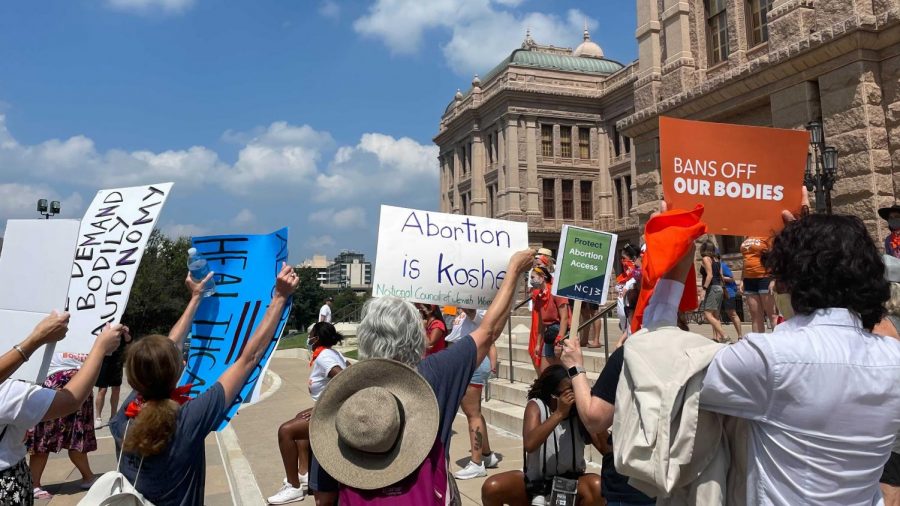Democrats Attempt to Pass the Women’s Health Protection Act
October 1, 2021
On Thursday, September 2nd, Speaker Nancy Pelosi announced that a vote to codify Roe v. Wade through the Women’s Health Protection Act would be taking place in the House of Representatives. This comes after recent moves from various southern states calling for more restrictions and bans on abortions with the most egregious example being the recent abortion ban in Texas. The said law in question, Senate Bill 8 (SB8), restricts a woman’s right to have an abortion after six weeks have passed since the pregnancy, with the threat of a lawsuit to any clinic performing illegal procedures for up to $10,000. The bill does not make any exemptions under any circumstances including rape and/or incest.
If Democrats are successful in codifying Roe v. Wade and passing the Women’s Health Protection Act through the House and afterward the Senate, through either federal and/or state law, a woman’s right to an abortion would be protected from any government infringement. The call for the codification from Pelosi and Democrats was a result of the Supreme Court’s decision to uphold Texas’ new abortion ban which, like the topic of abortion itself, has proven to be extremely controversial in recent years.
Republicans and Texan officials reference the Bible and argue that everything is a part of “God’s plan” and that abortion is considered murder in the eyes of the Bible, which brings into question the old, unwritten, policy of the separation of church and state. However, Democrats argue that the abortion law itself is unconstitutional with many citing that Roe v. Wade as a legal precedent, blocks states from infringing on abortions until after 24 weeks (approx. 6 months). The fact that SB8 acts as soon as 6 weeks, is argument enough for officials to believe the law is unconstitutional.
When asked, Wayne Hills senior Jaein Han explained her stance on SB8. “Personally I’m pro-choice because there are so many different reasons for an unwanted pregnancy including rape and I think the decision to get an abortion or not should be up to individuals rather than the government. I’m not too surprised about it though because Texas has historically been very conservative.”
According to Linda McClain, a professor of law of both BU and Robert Kent, the reason why SB8 is essentially an extreme measure is “because you pass a blatantly unconstitutional law, and then make private citizens the enforcer, so you try to avoid federal court review.” The Texas government intentionally made this decision as it makes it that much harder to lobby a law that technically has no federal enforcement, as citizens are used to enforcing the bill.
Since the institution of the law at the beginning of September, many women in Texas have made preparations and long trips to other states in order to get the procedures that they need and that are no longer provided by the state. Texas’s attorney general, Ken Paxton, however only seems to be focused on the economic side of the issue, and affirms the law should stay as it helps promote interstate commerce. “What evidence that does exist in the record suggests that, if anything, the Act is stimulating rather than obstructing interstate travel.” Said Paxton, defending his support of the bill.
Many have criticized the bill since its inception at six weeks is the least amount of time that a woman can learn that they are pregnant, with the bill referencing nothing about the many factors that can lead to a woman getting a late menstrual cycle (medication, diet, mental state, etc.). One of the largest arguments made by advocates for pro-choice is the idea that a man should not be allowed to dictate what a woman does or does not do with her body and the choices that they make regarding their health. The issue also lies with the fact that those who receive abortions only do so because they are not ready to care for a child and/or are not financially able to do so.
“I think citizens should not be allowed to enforce the bill and officials should have no business to decide what women do with their body especially when it’s mostly men making those decisions,” said Cathlene Galloza, a junior here at Wayne Hills.
As of September 24, 2021, the Women’s Health Protection Act was passed through the House of Representatives by just hitting the minimum of 218 votes required to pass it. It is however unlikely that the bill will be passed through the Senate, as it requires at least 10 Republicans to support the bill and block a potential (and likely) filibuster. With only being in effect for one month, the bill has already hindered many attempts by women to receive abortions, either in-state or more than likely in others. If SB8 continues to cement itself further into the law, it may lead to more restrictions and bans on abortions, restricting the health rights of women across the entire country.






